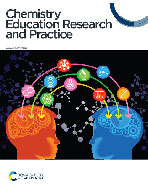Qualifying domains of student struggle in undergraduate general chemistry laboratory
Abstract
Learning and learning goals in undergraduate chemistry laboratory have been a popular research topic for the past three decades due to calls for curriculum reform, cost justification, and overall efficacy of necessary skill development. While much work has been done to assess curricular interventions on students’ learning and attitudes towards lab, few have discussed the increased difficulties of these non-traditional laboratory activities or the obstacles students must overcome in the laboratory setting. The work presented here focuses on student struggles in undergraduate general chemistry laboratory activities, the source of these struggles, and the actions students take to overcome them. Using an activity theoretical lens and multiple domains (cognitive, epistemological, socioemotional, and psychomotor), we developed a domains-of-struggle framework which encompasses how struggles emerge through contradictions within the laboratory activity system. This framework was extended and refined through iterative analysis of two consecutive semesters of undergraduate general chemistry laboratory (GC1 and GC2) video (n = 51), survey (n = 327), and interview (n = 44) data. In this paper, we model the activity system of the general chemistry laboratory, define the domains of struggle observed, and present actions the students took to move past these obstacles, while illustrating the interconnected complexity of the activity system. We then discuss how this framework may be used in future curriculum design or teacher training, as well as potential for future research on the learning outcomes associated with moments of struggle.


 Please wait while we load your content...
Please wait while we load your content...